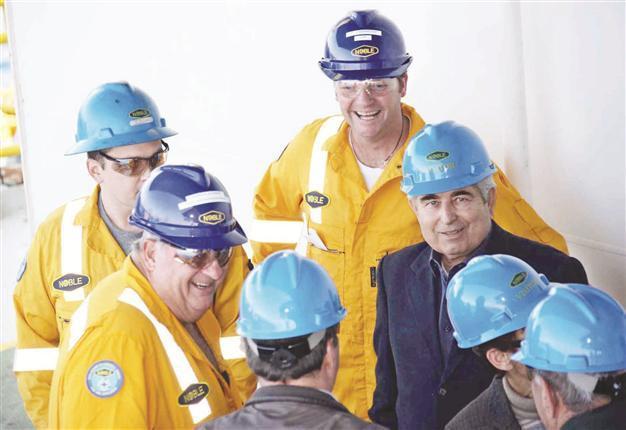Greek Cyprus ignores Turkey’s gas resistance
NICOSIA - Reuters

A picture released by the official Greek Cypriot press Office in November, 2011, shows President Demetris Christofias
(3rd R) as he visits a platform owned by Noble, the first firm to seek Mediterranean gas for Greek Cyprus. AFP photo
Greek Cyprus has vowed to continue to develop offshore natural gas reserves, despite harsh criticism from Turkey, who claims such research is illegal.
In response Greek Cyprus accused Turkey of trying to stir up tensions after warning multinationals not to participate in the island’s projects.
Last week, Turkish Energy Minister Taner Yıldız warned Eni, one of the four international companies that Greek Cyprus had declared it would start talks with, that Turkey would review that firm’s domestic investment if it went ahead with the Greek Cypriot project.
“Turkey is once again showing its true face,” Greek Cyprus’ Foreign Ministry said. “It is a record burdened with violations of international law both as regards its international and national mode of behavior,” Reuters quoted it as saying.
“The Republic of Cyprus will continue in its hydrocarbons policy decisively and without any distraction.”
Turkey says the gas project ignores the equal rights Turkish Cypriots have over natural resources.
Turkish reaction“Those companies cooperating with GCA [Greek Cypriot Administration] will not be allowed to take part in new energy projects in Turkey,” the Turkish Foreign Ministry said in a statement Nov. 3.
Greek Cyprus said Oct. 30 it would start talks with multinationals including Italy’s ENI, South Korea’s Kogas, France’s Total and Russia’s Novatek for the potential development of natural gas fields to the island’s south.
Last year Greek Cyprus reported its first gas find with Noble of a mean 7 trillion cubic feet of natural gas south of a sea area bordering Israel.
One reason for Greek Cyprus’ interest in developing gas reserves is the state of its economy after the cash-strapped nation was forced to seek an international bailout. Greek Cyprus, which now holds the rotating EU chair, says it is within its sovereign right to explore, while Turkey is waiting for a boost in its EU membership process in January 2013, when the Greek Cyprus’ term chair ends.
